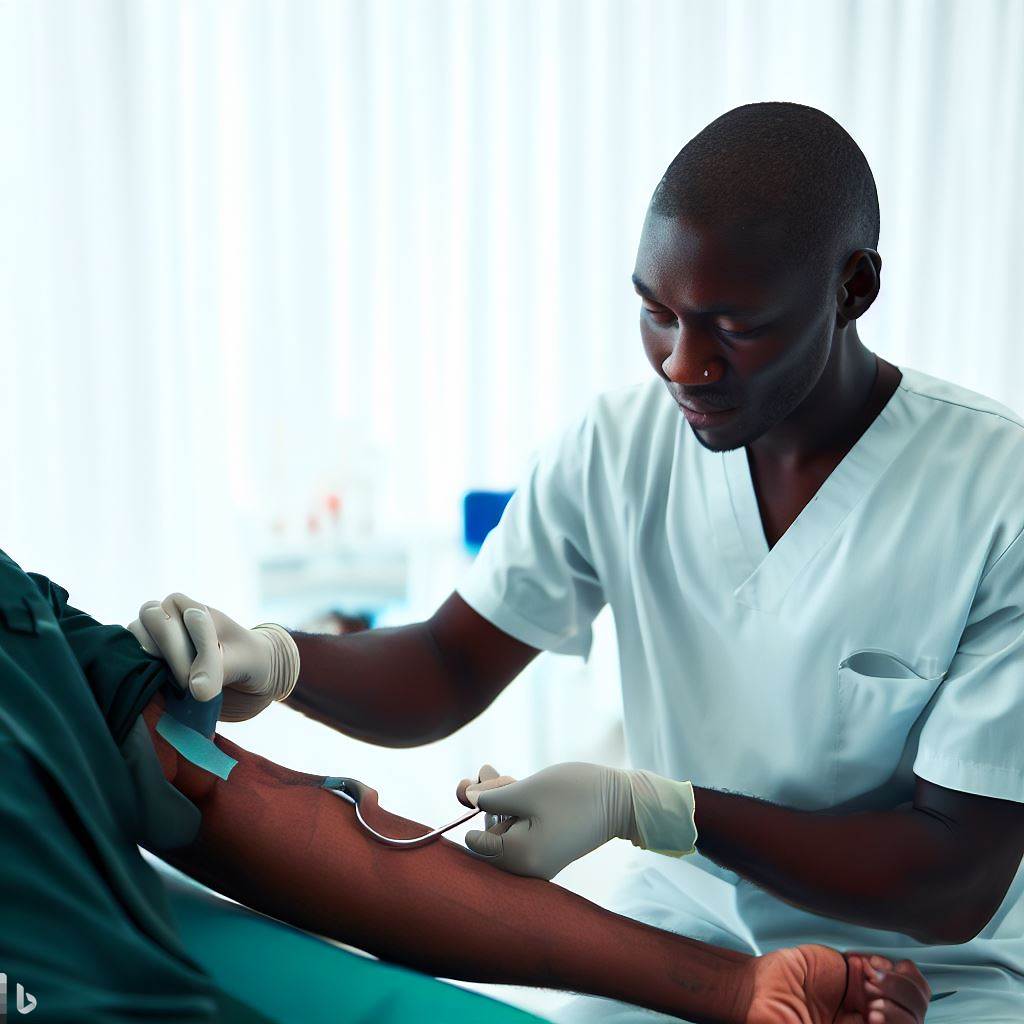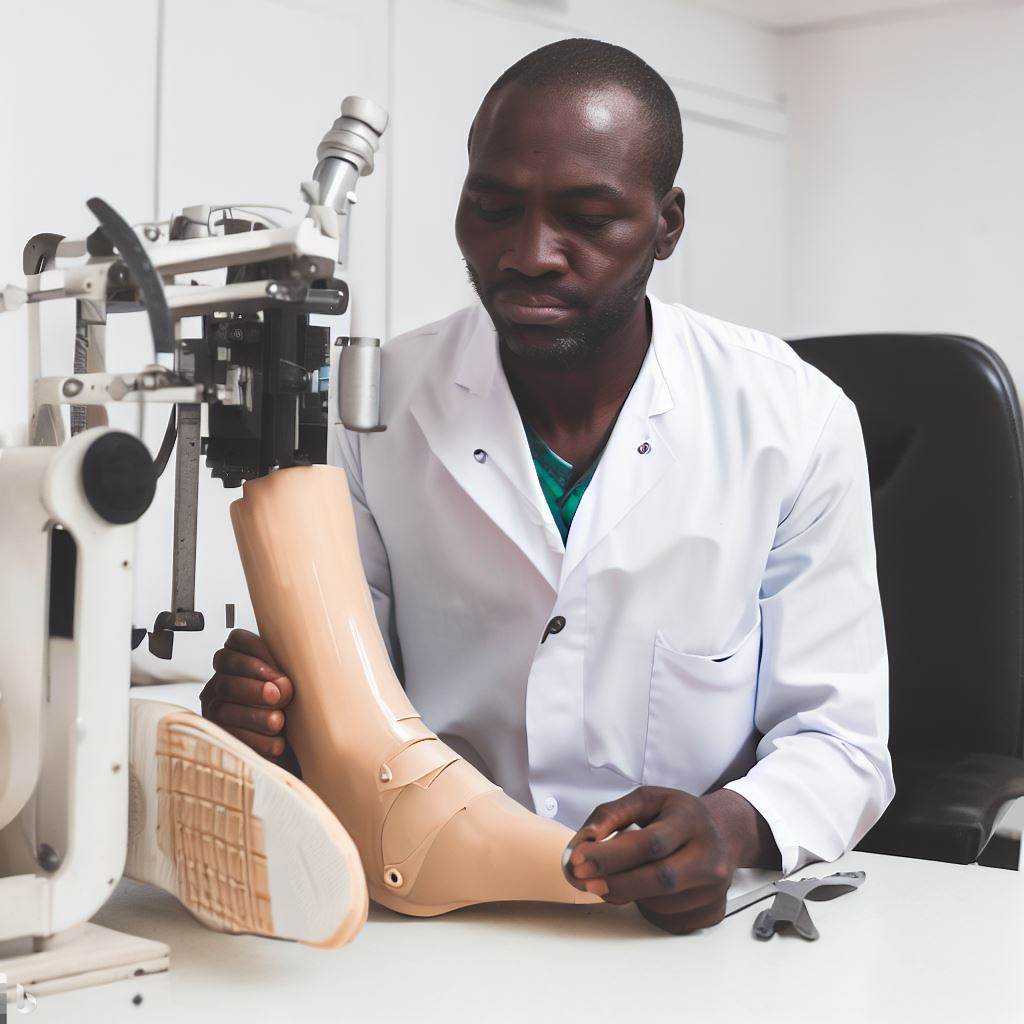Introduction
Brief Explanation of the Topic
This blog post delves into Phlebotomists’ salaries in Nigeria, shedding light on their earnings and factors influencing them.
Importance of Understanding Phlebotomist Salaries in Nigeria
- Ensuring Fair Compensation: Knowledge of average salaries aids in fair pay practices for professionals.
- Attracting Top Talent: Competitive wages attract skilled phlebotomists, improving healthcare services.
- Retention Strategies: Understanding salary trends helps in devising better retention strategies.
- Policy Implications: Data on salaries can influence healthcare policies and workforce development initiatives.
- Career Decision-Making: Aspiring phlebotomists benefit from knowing potential earnings in the field.
- Economic Insights: Salary analysis contributes to the understanding of healthcare’s economic impact in Nigeria.
Overview of Phlebotomy in Nigeria
Phlebotomy, the process of drawing blood, has become an integral part of the healthcare system in Nigeria.
Its significance cannot be overstated as it contributes to the diagnosis, treatment, and monitoring of various medical conditions.
This section provides an overview of phlebotomy in Nigeria, including the definition and role of a phlebotomist, the importance of phlebotomy in healthcare settings, and the rising demand for phlebotomists in the country.
Definition and role of a phlebotomist
A phlebotomist is a healthcare professional trained to safely and accurately collect blood samples from patients.
They are responsible for ensuring patient comfort during the blood collection process and maintaining the integrity of the collected samples.
Phlebotomists also label, store, and transport the samples to the laboratory for analysis.
Importance of phlebotomy in healthcare settings
Phlebotomy is a critical procedure in healthcare settings for several reasons. Firstly, blood samples obtained through phlebotomy are essential for diagnosing various diseases and conditions.
They provide valuable information about patients’ overall health, including blood cell counts, cholesterol levels, and glucose levels.
This information assists physicians in making accurate diagnoses and developing appropriate treatment plans.
Secondly, phlebotomy is crucial for monitoring treatment progress. Regular blood tests enable healthcare professionals to measure the effectiveness of medications and interventions, adjusting them if necessary.
This helps in ensuring patients’ well-being and optimizing their treatment outcomes.
Thirdly, phlebotomy plays a vital role in blood transfusions. Prior to any transfusion, blood samples are drawn to determine the patient’s blood type and check for any compatibility issues or infectious diseases.
Phlebotomists guarantee the safety of blood transfusions by accurately collecting and labeling the samples, minimizing the risk of complications.
Rising demand for phlebotomists in Nigeria
In recent years, Nigeria has witnessed a growing demand for skilled phlebotomists. The country’s population is rapidly expanding, resulting in an increased need for healthcare services.
Additionally, advancements in medical technology and the availability of more sophisticated diagnostic tests have further augmented the demand for qualified professionals who can perform phlebotomy.
Accurate and reliable blood test results are vital for proper diagnosis and effective treatment.
The demand for phlebotomists in Nigeria stems from the healthcare sector’s recognition of the significance of quality blood samples in ensuring accurate laboratory analyses.
As a result, healthcare institutions, including hospitals, clinics, and diagnostic centers, are actively seeking skilled phlebotomists to meet their growing needs.
In essence, phlebotomy plays a crucial role in the Nigerian healthcare system. Trained phlebotomists are indispensable in accurately and safely collecting blood samples for diagnostic testing and transfusions.
The rising demand for phlebotomists in Nigeria is a testament to the importance of their role in the delivery of quality healthcare services.
Read: Challenges Faced by Pediatricians in Nigeria: A Deep Dive
Factors Influencing Phlebotomist Salaries
Education and certification requirements
Higher education and certification can lead to higher salaries for phlebotomists in Nigeria. Employers value candidates with formal education and certification in phlebotomy.
Completing a phlebotomy program demonstrates commitment to the profession and can result in better job opportunities.
Certification from recognized organizations such as the Nigerian Association of Phlebotomists can increase earning potential.
Level of experience and specialization
Phlebotomists with more experience tend to earn higher salaries due to their expertise. Specializing in a specific area of phlebotomy, like pediatric or geriatric phlebotomy, can lead to higher pay.
Employers may offer higher salaries to phlebotomists who have a track record of success and accomplishments.
Continuous professional development and ongoing training can also boost earning potential for phlebotomists.
Geographical location within Nigeria
Salaries for phlebotomists can vary significantly depending on the geographical location within Nigeria. Urban areas with higher costs of living, like Lagos or Abuja, may offer higher salaries.
Rural areas or less developed regions may have lower salaries due to lesser demand for phlebotomists.
Phlebotomists should consider the cost of living and job prospects in different regions when evaluating salary offers. In fact, several factors influence phlebotomist salaries in Nigeria.
The level of education and certification obtained, along with the specialization and experience of the phlebotomist, play a significant role in determining their earnings.
Additionally, the geographical location within Nigeria can impact salary levels due to differences in demand and cost of living.
Phlebotomists should strive to upgrade their skills, seek certifications, and consider opportunities in regions that offer competitive salaries.
Read: Inspirational Stories of Nigerian Occupational Therapists
Average Salaries of Phlebotomists in Different Nigerian States
Comparison of salaries in major cities
- Lagos: The average salary of phlebotomists in Lagos is higher compared to other states due to higher demand and cost of living.
- Abuja: Phlebotomists in Abuja also enjoy higher salaries, as the city is the capital and has a thriving healthcare industry.
- Port Harcourt: Salaries in Port Harcourt are competitive, but slightly lower than Lagos and Abuja due to regional differences.
- Kano: Phlebotomists in Kano earn lower salaries, mainly because the state has a lower cost of living and lesser demand.
- Ibadan: Salaries in Ibadan are lower as compared to the major cities, reflecting the lower healthcare infrastructure and demand.
Analysis of rural versus urban salary differences
- Rural areas: Phlebotomists in rural areas generally receive lower salaries due to limited healthcare facilities and lower demand.
- Urban areas: Urban phlebotomists have higher salaries, as they work in bigger hospitals and have access to better job opportunities.
Factors contributing to salary variations among states
- Healthcare infrastructure: States with better healthcare facilities often have higher demand for phlebotomists, resulting in higher salaries.
- Cost of living: Cities with a higher cost of living, such as Lagos and Abuja, tend to offer higher salaries to compensate for the increased expenses.
- Population density: States with a higher population will typically have more healthcare institutions, leading to increased demand and higher salaries for phlebotomists.
- Education and certifications: Phlebotomists with advanced certifications and specialized training may receive higher salaries in all states.
- Competition: The level of competition among phlebotomists in a state can affect salaries, with more competition leading to lower salaries.
In the end, phlebotomists in different Nigerian states experience variations in their average salaries. Major cities like Lagos and Abuja offer higher salaries due to higher demand and cost of living.
In contrast, rural areas have lower salaries due to limited healthcare facilities.
Various factors such as healthcare infrastructure, cost of living, population density, education, certifications, and competition contribute to these salary variations.
Phlebotomists should consider these factors when choosing a location to work and negotiate their salaries accordingly.
Read: Continuing Education for Occupational Therapists in Nigeria
Salary Range Based on Experience and Specialization
Entry-level phlebotomist salaries
Entry-level phlebotomists in Nigeria earn an average salary ranging from ₦500,000 to ₦800,000 per year. These salaries are primarily determined by factors such as location, employer, and level of education.
In major cities like Lagos and Abuja, entry-level phlebotomists tend to earn higher salaries due to the higher cost of living.
Mid-level phlebotomist salaries
As phlebotomists gain more experience, their salaries also increase. Mid-level phlebotomists in Nigeria can earn an average salary ranging from ₦800,000 to ₦1.2 million per year.
This increase in salary is often influenced by factors such as additional certifications and skills acquired over time.
Phlebotomists who work in specialized healthcare facilities or private clinics may also earn higher salaries.
Senior and specialized phlebotomist salaries
Senior and specialized phlebotomists in Nigeria are highly experienced professionals who possess advanced skills and knowledge.
These professionals can earn an average salary ranging from ₦1.2 million to ₦1.8 million per year. Their salaries often reflect their expertise, additional certifications, and the demand for their specialized skills.
Senior phlebotomists who hold leadership positions or work in prestigious healthcare institutions may earn higher salaries.
The salary range of phlebotomists in Nigeria varies based on their experience and specialization. Entry-level phlebotomists earn an average salary ranging from ₦500,000 to ₦800,000 per year.
Mid-level phlebotomists earn an average salary ranging from ₦800,000 to ₦1.2 million per year. Senior and specialized phlebotomists earn an average salary ranging from ₦1.2 million to ₦1.8 million per year.
Factors such as location, employer, additional certifications, and skills acquired over time influence these salary ranges.
It is important for aspiring phlebotomists to consider these salary ranges when planning their career path and professional development.
Read: Understanding the Nigerian Mental Health Act: A Guide

Benefits and Perks for Phlebotomists in Nigeria
Healthcare coverage and insurance
Phlebotomists in Nigeria enjoy healthcare coverage provided by their employers. This coverage includes medical, dental, and vision insurance.
It ensures that phlebotomists have access to quality healthcare whenever they need it. Having healthcare coverage also reduces the financial burden of medical expenses for phlebotomists.
It promotes a healthier workforce and improves job satisfaction among phlebotomists.
Annual leave and vacation days
Phlebotomists in Nigeria are entitled to annual leave and vacation days. The number of days may vary depending on the organization and its policies.
Annual leave allows phlebotomists to take time off work for personal reasons, such as vacations or family events. It helps in maintaining a work-life balance and prevents burnout among phlebotomists.
Vacation days provide much-needed breaks, allowing phlebotomists to recharge and rejuvenate.
Professional development opportunities
Phlebotomists in Nigeria have access to various professional development opportunities. These opportunities can include attending conferences, workshops, or training programs.
They enable phlebotomists to enhance their skills, stay updated with the latest advancements in their field, and expand their knowledge.
Professional development opportunities contribute to career growth and advancement for phlebotomists. They also demonstrate that organizations value the professional growth of their phlebotomists.
Overall, the benefits and perks for phlebotomists in Nigeria play a crucial role in attracting and retaining talented professionals in the field.
The healthcare coverage and insurance provided ensure that phlebotomists have access to essential medical services.
This not only benefits the phlebotomists themselves but also contributes to a healthier workforce.
Additionally, the provision of annual leave and vacation days recognizes the importance of work-life balance.
It allows phlebotomists to take breaks and spend time on personal activities, ultimately improving their well-being and job satisfaction.
Lastly, professional development opportunities empower phlebotomists to continuously improve their skills and knowledge.
It indicates that organizations value their growth and provide avenues for advancement.
This fosters a sense of belonging and motivation among phlebotomists, resulting in higher job performance and overall professional development.
In short, the benefits and perks offered to phlebotomists in Nigeria, such as healthcare coverage, annual leave, and professional development opportunities, contribute to creating a positive work environment and attracting skilled professionals to the field.
These factors are essential in ensuring the growth and success of the phlebotomy profession in Nigeria.
Challenges Facing Phlebotomist Salaries in Nigeria
Lack of standardized salary structures
The absence of standardized salary structures makes it difficult to determine fair compensation for phlebotomists.
Without standardization, salaries vary widely between hospitals, clinics, and healthcare facilities. This lack of consistency creates an environment of uncertainty and unfairness in salary negotiations.
Phlebotomists often find themselves underpaid or struggling to negotiate for a fair wage. Efforts should be made by healthcare governing bodies to establish standardized salary structures for phlebotomists.
Limited advocacy for fair wages
Phlebotomists in Nigeria face a significant challenge in the limited advocacy for fair wages. There is a lack of organizations or unions dedicated specifically to representing the interests of phlebotomists.
Without a strong voice advocating for their rights, phlebotomists are left vulnerable to exploitation by employers.
Advocacy groups should be established to address the specific needs and concerns of phlebotomists. These groups can work towards raising awareness and campaigning for fair wages in the profession.
Economic factors affecting salary growth
Phlebotomist salaries in Nigeria are influenced by several economic factors. Inflation and economic instability can negatively impact salary growth and buying power.
As the economy fluctuates, salaries may not keep up with the rising cost of living. Phlebotomists often struggle to maintain their standard of living due to stagnant wages.
Efforts should be made by the government and healthcare institutions to ensure salary growth keeps pace with economic changes.
Basically, phlebotomists in Nigeria face several challenges in terms of salary.
The lack of standardized salary structures, limited advocacy, and economic factors all contribute to the difficulties phlebotomists encounter in earning fair wages.
The establishment of standardized structures, dedicated advocacy groups, and efforts to align salary growth with economic changes are essential in addressing these challenges and ensuring equitable compensation for phlebotomists in Nigeria.
Opportunities for Improving Phlebotomist Salaries
As the demand for phlebotomists continues to rise in Nigeria, it is crucial to explore opportunities for improving their salaries. Several strategies can be implemented to achieve this goal:
Professional associations and lobbying efforts
Establishing professional associations for phlebotomists can bring them together and amplify their voices.
Publish Your Professional Profile, Business or Brand
Showcase your expertise, gain trust, and boost visibility instantly on Professions.ng.
Publish NowThese associations can organize lobbying efforts to advocate for higher salaries and better working conditions.
By working collectively, phlebotomists can increase their chances of success in negotiating for better compensation.
Engaging in effective lobbying can provide phlebotomists with an opportunity to create positive changes in their industry.
Promoting continuing education and specialization
Encouraging phlebotomists to pursue continuing education and specialization can lead to higher salaries.
Additional certifications and advanced training can enhance phlebotomists’ skills and make them more valuable in the job market.
Employers may be willing to offer higher salaries to phlebotomists with specialized knowledge and expertise.
Continuing education can also help phlebotomists stay updated with the latest industry trends and techniques.
Government intervention and policies
The government can play a significant role in improving phlebotomist salaries through intervention and policy-making.
Implementing fair wage policies that consider the importance of phlebotomists in the healthcare system is essential.
The government can set minimum salary standards for phlebotomists to ensure they receive fair compensation.
Providing financial incentives to healthcare facilities that offer competitive salaries can also drive salary improvements.
In a nutshell, phlebotomists in Nigeria have opportunities to improve their salaries through various means.
Professional associations and lobbying efforts can amplify their voices, while promoting continuing education and specialization can make them more valuable in the job market.
Government intervention and policies can also play a crucial role in ensuring fair compensation for phlebotomists.
By exploring and implementing these strategies, phlebotomists can strive for better salaries and recognition for their vital role in the healthcare system.
Conclusion
Recap of key points discussed
Phlebotomists in Nigeria play a crucial role in healthcare by collecting blood samples for diagnostic purposes. Despite their importance, phlebotomists are often overlooked and receive low salaries.
Low salaries result in demotivation, high turnover rates, and a shortage of skilled phlebotomists in the country.
Importance of fair compensation for phlebotomists
Offering fair salaries is essential to attract and retain qualified phlebotomists, ensuring quality healthcare services.
Well-compensated phlebotomists will be more motivated, leading to better job performance and improved patient outcomes.
Call-to-action for stakeholders to address salary disparities
Government and healthcare institutions must prioritize fair compensation for phlebotomists. Advocacy groups should raise awareness about the importance of phlebotomists and the need for adequate salaries.
Stakeholders should collaborate to establish standardized salary scales, ensuring equal pay for equal work.
By addressing salary disparities, Nigeria can attract and retain skilled phlebotomists, ultimately improving healthcare services nationwide.




